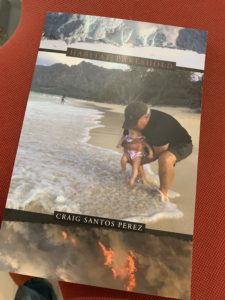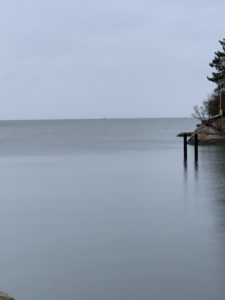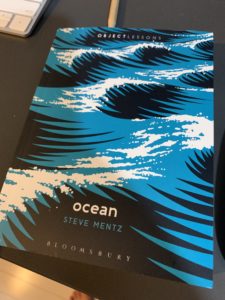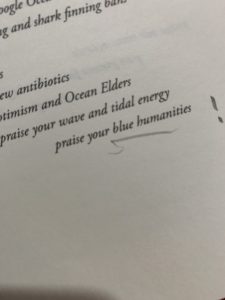What can you send to a beautiful baby boy who’s three thousand miles away during a global lockdown?
Poetry! What else?
This past Sunday 3/31/20, my nephew Ford Bryant Sterling was born in Los Angeles. Thanks to the kindness and dedication of the health care workers at Cedars-Sinai Hospital, he is home now with his parents in North Hollywood. The way things are looking, it’ll be some time before I can go see him in person.

Last night, after hardly being able to read at all during the first several weeks of our Covid-frozentime, I was thinking about Baby Ford when I picked a new book off the disorganized pile at my bedside: Habitat Threshold, the latest book of poetry by the brilliant Craig Santos Perez. Eco-poetry and sea lyrics, these poems narrate the story of Perez’s family in Hawai’i, his native Guam, and California. A touching cover photograph shows the poet’s father dipping his granddaughter’s feet in gentle surf. The poems explore bringing new life into a broken world, the intersections between children and climate change, and the suturing power of the World Ocean.
I’ve contacted the independent publisher Omnidawn to order a copy to be sent to Baby Ford, c/o his parents, who will need to hang on to it for him until he learns to read. It’s a small gift, and one that Ford won’t be able to understand for years. But these poems seem the right present to offer to this new presence in the world.

Habitat Threshold combines a bleak and accurate view of eco-crisis and the polluted ocean with the salty blue taste of hope. Its images of Perez and his family are heartening in this dark time. They make me think of the world we are making and breaking and passing on to our children.
My favorite line in the whole book might be from the lovely poem “Echolocation,” which concludes that “love is our wildest / oceanic instinct.”
The book overflows with witty pastiches, including Wallace Stevens’s thirteen blackbirds reprised as melting glaciers and William Carlos Williams’s cold plums recast as Impossible burgers. The poem “Love in a Time of Climate Change” channels Neruda rather than Garcia Marquez, reframing the great Chilean writer into eco-immortality, “in the nitrogen-rich compost of our embrace.”
Two structuring spines of the collection appear in the longer poems “Chanting the Waters” and “Praise Song for Oceania.” The first, dedicated to the Standing Rock Sioux Tribe and “water protectors everywhere,” sprawls out water’s physical meanings — our planet is 70 percent water, our skin is 60 percent water, our eyes are 95 percent water, “because mountains embrace ocean into blessings of rain” — that echo like a home-marking drum.

The closing poem, “Praise Song for Oceania,” has already been turned into a gorgeous and lyrical short film, created by Hawaiian filmmaker Justyn Ah Chong. Dedicated to World Oceans Day (June 8), the poem gathers together so much of what draws us to the great waters, what collects us near tidepools and beaches, and what resists our final knowing. “praise your capacity for birth,” says the poem to the Ocean and to Baby Ford. “praise your capacity to remember,” it says to me and to Baby Ford’s scattered relations. “praise your capacity for communion,” to us all, separated as we are today.
The Praise Song even includes a generous nod toward the idea that when we look at the Ocean we should “praise your blue humanities.” This line recasts the phrase that many people, including me, use as a description of a group of scholars & writers & teachers. In Perez’s song, the blue humanities swim outside academic and intellectual cultures to become the plural humanizing features of the World Ocean itself, insinuating its green-blue fingers into our minds & onto our bodies.

So, with thanks to the poet and the many tentacles of the World Ocean, from the cold gritty beach down the street from my house in Connecticut to the wide shores of Santa Monica and Venice near Ford’s home in Los Angeles to the warm waters where Craig Santos Perez dips his daughter’s toes in the Pacific in Hawai’i, these poems are my gift in absentia to Baby Ford, newly arrived in this moment of crisis in our world.
Live happy in this habitat, little one. I look forward to seeing you someday soon!